
Mirra Wicker ⭐️Licensed Therapist ⭐️ Parent Coach
Offering compassionate care to support connected pregnancy, birth, and parenting. Mom of 2, Parenting from Within, Attachment Science, Re-Parenting
Recent Posts
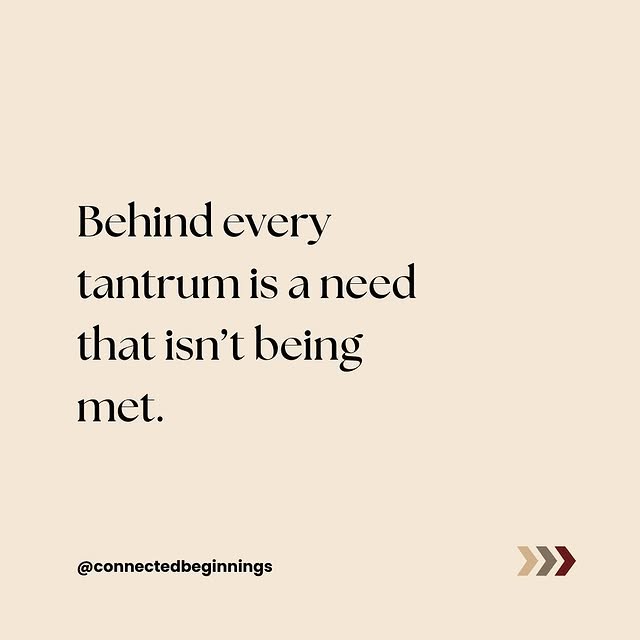
Tantrums are not about bad behavior—they’re your child’s way of communicating an unmet need. ✨ Behind the behavior, there’s always a reason: - Are they hungry, tired, or overstimulated? - Do they feel disconnected or out of control? When we pause to understand the _why_, we can respond with compassion instead of judgment. 💡 Here’s how to tend to the need under the behavior: 1️⃣ Pause and reflect: “What might they be trying to tell me?” 2️⃣ Validate their emotions: “You’re upset because we’re leaving, and you’re not ready.” 3️⃣ Meet the need: “Let’s decide together what to do next time.” 💬 Dr. Gordon Neufeld reminds us, “Behavior is the language of unmet needs.” When we approach tantrums with curiosity instead of frustration, we model empathy and help our children feel safe in their big emotions. 🌟 ➡️ Want to learn more about understanding your child’s needs? Download my free guide—link in bio! — #PositiveParenting #ParentingWisdom #BigFeelings #CompassionateParenting #TantrumHelp #tantrums #mindfulparenting #listentoyourkids #drgordonneufeld #parentingquotes #parentingtips #connectedbeginnings #theconnectedparent

A must-watch! This video delves into how stress affects our bodies and overall health, offering practical solutions for managing stress and fostering growth in all areas of life. After watching, I’d love to hear your thoughts: • What reactions or insights arose for you? • Where do you feel the most stress in your life? • How do you manage stress, and what changes do you notice when you apply these tools? • How could the concepts in this video transform your life? Share your experiences and let’s discuss how we can support each other in navigating our stress more effectively! #stressfree #emotionalregulation #mindset #consciousparenting #gentleparenting #awareparenting #attachmentparenting #connectedparenting #intentionalparenting #intentionalliving #consciousliving #mindfulparenting #intentionalmotherhood #licensedtherapist
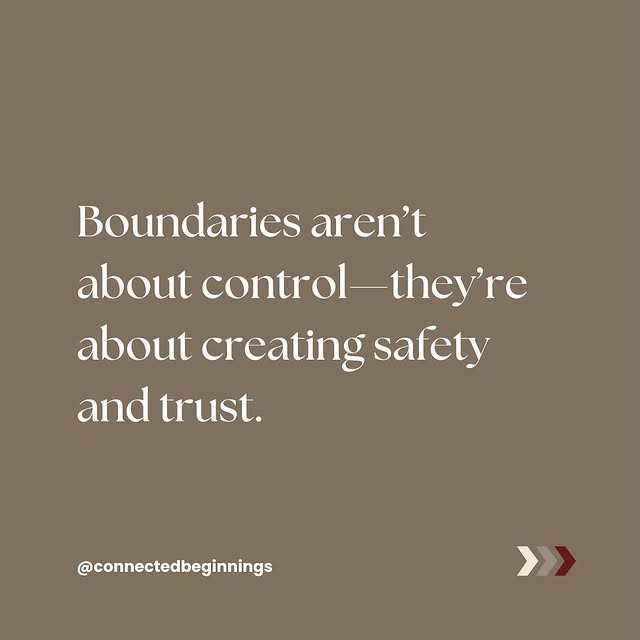
✨ Boundaries are not about controlling your child—they’re about creating a safe and predictable environment where they can learn and grow. 💡 Why are boundaries so important? 1️⃣ They provide a sense of security: Predictable limits help children feel safe. 2️⃣ They teach self-discipline: Boundaries help kids learn to manage their own choices and behaviors. 3️⃣ They prevent overwhelm: Consistent boundaries reduce chaos for both parents and kids. Setting boundaries with love ensures they are respected, not feared. For example: If your child is jumping on the couch, calmly say, “Couches are for sitting. Please put your feet on the ground.” If they continue, follow through: “I see your body is having a hard time staying still. I’m going to help your body off the couch.” Gently guide them down, showing them the boundary will be upheld without anger or frustration. 💬 Dr. Becky Kennedy reminds us, “Boundaries are not walls—they’re the bridges that guide children toward safety and understanding.” Parenting with boundaries isn’t about control—it’s about teaching your child how to navigate their world with respect and connection. 🌟 ➡️ How do you approach boundaries in your home? Let’s share ideas in the comments below! #PositiveParenting #LovingBoundaries #ParentingWisdom #ConnectedParenting #ParentingTips #ConnectedBeginnings #TheConnectedParent #boundaries #kidsboundaries #childdevelopment #mindfulparent #mindfulparenting
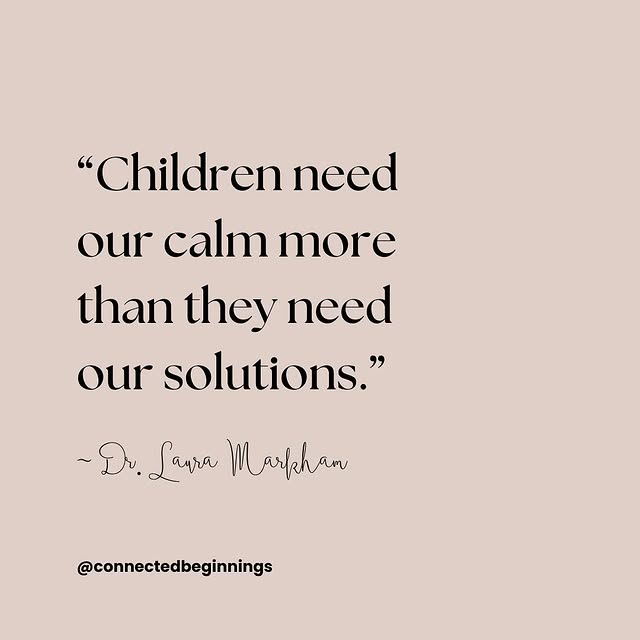
“Children need our calm more than they need our solutions.” – Dr. Laura Markham ✨ This simple yet powerful truth is a reminder that as parents, our calm presence can be the greatest gift we offer our children. When our kids are in the middle of big emotions—whether it’s frustration over a broken toy, sadness over a lost game, or anger at a sibling—it’s easy to jump into “fix-it” mode. But often, they’re not looking for a solution. They’re looking for reassurance that their feelings are valid and that they’re not alone. 💡 What does staying calm look like in practice? - **Pause before reacting**: Take a deep breath to regulate your own emotions first. - **Validate their feelings**: Say, “I see you’re really upset right now. It’s okay to feel this way.” - **Be present**: Sit quietly with them, offer a comforting hug, or simply stay close until they’re ready to talk. By modeling calm, we teach our children that big feelings are manageable and that they can trust us to be their anchor during emotional storms. Parenting isn’t about having all the answers—it’s about creating a safe space where your child feels seen, heard, and loved. 🌟 I have an upcoming class designed to help parents stay calm, connect deeply with their children, and handle challenging emotions with confidence! 💡 If you’re tired of feeling overwhelmed and want to learn actionable strategies to create a peaceful home, this class is for YOU! Comment “CLASS” if you are interested. #PositiveParenting #ConsciousParenting #ParentingWisdom #EmotionalRegulation #ConnectedParenting #calmparenting #attachmentparenting #mindfulparenting #mindfulparent #howtostaycalm #calmpresence #listentoyourkids

When your child shares challenging feelings with you, it’s a chance to strengthen your bond and support their emotional growth. Here are three simple steps to effectively navigate these moments: 🌿 1. Pause and Breathe: Before responding, take a moment to breathe deeply. This helps you stay calm and present. 2. Validate Their Feelings: Acknowledge their emotions with affirmations like, ‘It sounds like you’re really worried about your playdate, and that’s okay.’ 3. Encourage More Sharing: Ask open-ended questions like, ‘Can you tell me more about it?’ or express gratitude for their openness by saying, ‘I’m so glad you’re telling me this.’ By following these steps, you not only help your child process their emotions but also teach them how to articulate and manage their feelings. This approach not only aids their development but also deepens the trust and connection between you. 💕 For more parenting support, comment GUIDE below and I’ll send you a free company of my Connected Parenting E-Book. #ParentingTips #EmotionalIntelligence #familybonding #attachmentparenting #consciousparenting #awareparenting #gentleparenting #connectedparenting #intentionalparenting #parentcoach #mindfulparenting #intentionalmotherhood #dailyparenting #intentionalfamily #peacefulparenting

When our children are overwhelmed—angry, upset, or anxious—they often don’t yet have the tools to manage these emotions on their own. As parents, it can feel frustrating or even heartbreaking to watch. That’s where a calm down corner can become a lifesaver. ✨ What is a calm down corner? It’s a cozy, safe space designed to help your child regulate their emotions and calm their body. Whether your child spends time there alone or with you, this space is 100% about safety and soothing. It’s a judgment-free zone where your child can practice self-regulation skills. 💡 Here’s why it works: - It gives children a sense of security when they’re feeling overwhelmed. - It teaches self-regulation skills through calming techniques like deep breathing or mindfulness. - It helps them build resilience and emotional intelligence for the future. ✨How to Create One: Involve your child in setting up the calm down corner. Ask them: - What makes you feel safe and at peace? - What would you like to have nearby when you’re upset? Suggestions for your calm down corner: - A cozy, cocoon-like atmosphere with blankets and pillows. - Favorite comfort items like dolls, stuffed animals, or a lovey. - Tools for expression: art supplies, emotion-based books, or a sensory toy. - Calming aids: headphones, soothing music, or a Yoto player/iPod. - Snacks or a water bottle to address physical needs. ✨Practice Makes Progress: Spending time in the calm down corner _before_ emotions escalate can help your child build familiarity with calming tools. Daily practice makes it easier for them to turn to the calm down corner during challenging moments. 💛 Remember: The goal isn’t to force calm—it’s to give your child the tools and space they need to process their feelings in a supportive way. Never send a child to their calm-down corner alone. Instead, invite them to go there and stay with them to provide support and encourage co-regulation. 💬 Does your child have a calm down corner? What works for you? Share your tips below! #GentleParenting #MindfulParenting #ParentingTips #ChildDevelopment #BigEmotions #CalmParenting #ParentingJourney #EmotionalIntelligence #parentingwins
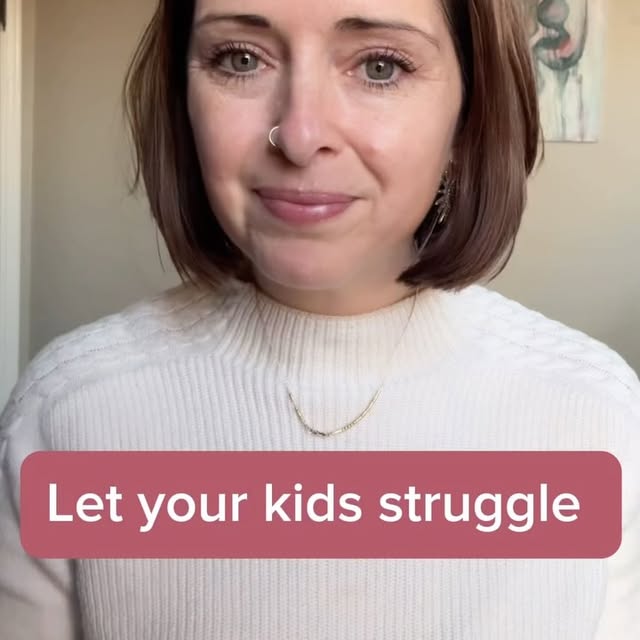
Letting our children face challenges isn’t about stepping back; it’s about stepping up in a different way. Instead of fixing every issue, what if we guide them through the struggle? 🤔 From tying shoelaces to navigating friendships, every challenge they meet builds their resilience and confidence. Remember, it’s not just about easing their path—it’s about preparing them to walk it confidently on their own. Where do you find it challenging to allow your child to struggle? For more support in becoming a sturdy leader within your family, comment SUPPORT below. #ParentingTips #Resilience #childdevelopment #confidentparenting #attachmentparenting #consciousparenting #awareparenting #peacefulparenting #gentleparenting #connectedparenting #responsiveparenting #parentcoach #intentionalparenting #mindfulparenting #intentionalmotherhood #dailyparenting #consciousfamily
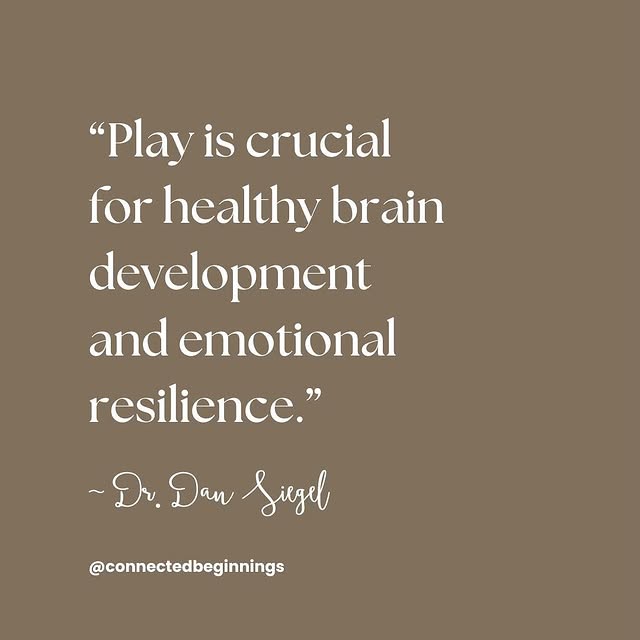
“Play is crucial for healthy brain development and emotional resilience.” – Dr. Dan Siegel ✨ Play isn’t just fun—it’s a fundamental part of how children learn, grow, and thrive. Through play, kids develop critical skills like problem-solving, self-regulation, and emotional resilience. 💡 Why is play so powerful? Brain Development: Play stimulates the brain, building neural connections that support creativity, critical thinking, and adaptability. Emotional Resilience: Play allows children to express emotions safely, practice handling challenges, and build confidence in their abilities. Stronger Bonds: Play strengthens the parent-child relationship by fostering joy and trust. 💬 Dr. Siegel explains, “When we engage in play with our children, we create moments of connection that build their sense of safety and belonging.” 💡 How can you incorporate play into your daily routine? Turn chores into games: “Let’s see who can pick up the most toys!” Use humor during stressful moments: Pretend to be a robot helping them clean up. Embrace imaginative play: Build a pillow fort or act out a silly story together. Play isn’t just about keeping kids entertained—it’s about equipping them with tools for life. When we make space for play, we nurture their brains, hearts, and spirits. 🌟 ➡️ What’s your favorite way to play with your child? Share below and inspire other parents! — #PlayfulParenting #ParentingWisdom #PositiveParenting #BrainDevelopment #ParentingTips
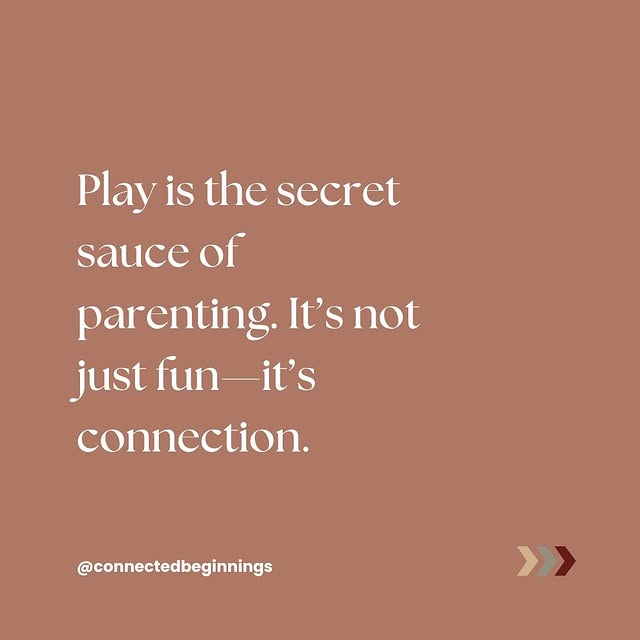
What if I told you that the secret to fewer tantrums and more cooperation lies in play? 🎉 ✨ Here’s why play is more than fun: It builds a strong parent-child bond, rooted in joy and trust. It activates oxytocin (the “feel-good hormone”), helping both parent and child regulate emotions. It transforms challenges into opportunities for connection. 💡 Examples of playful parenting in action: 1️⃣ Turn cleanup time into a race: “Let’s see who can put away more toys in 30 seconds!” 2️⃣ Use humor to diffuse tense moments: “Uh-oh, the sock monster is coming!” 3️⃣ Make bedtime magical by creating an imaginative story together. Dr. Dan Siegel emphasizes, “Play is crucial for healthy brain development and emotional resilience.” By bringing play into your daily routine, you’ll notice fewer power struggles and more joy. ➡️ Want more ideas for playful parenting? Download my free guide—link in bio. — #PlayfulParenting #ParentingTips #ParentingHacks #PositiveParenting #MindfulParenting #ConnectedBeginnings #TheConnectedParent #MindfulParenting
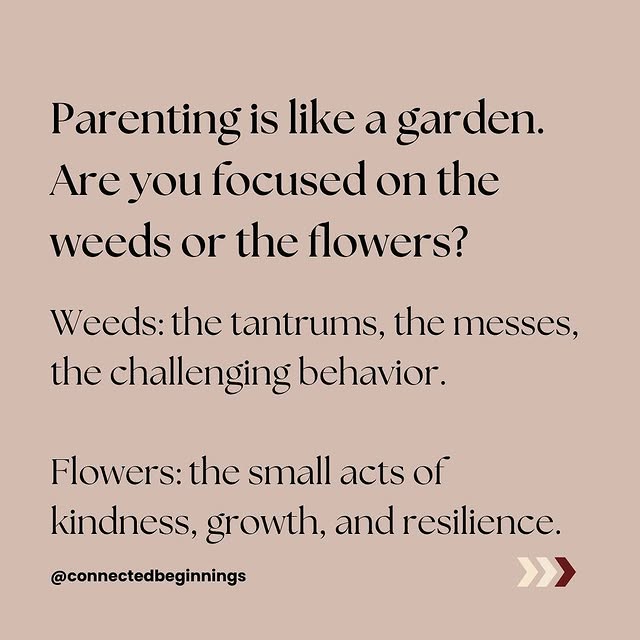
Parenting can often feel like a constant battle with the “weeds”—tantrums, messes, challenging behavior —but what if we shifted our focus to the flowers instead? 🌸 When we only see the weeds, frustration grows, and both parent and child feel defeated. But by noticing the beauty—the acts of kindness, moments of effort, and resilience—we can change the entire tone of our relationship. ✨ Here’s how to “water the flowers” in your parenting garden: 1️⃣ Celebrate small efforts. If your child cleans up even one toy, say, “Great start!” instead of focusing on the mess that remains. 2️⃣ Reflect on their positive qualities at bedtime: “I noticed how kind you were to your sibling today.” 3️⃣ Let go of perfection. Your child’s journey is about progress, not flawless behavior. 💬 “What you focus on grows.” – Dr. Dan Siegel Parenting is about growth—for both you and your child. 🌱 ➡️ Want more tools to reframe challenges and strengthen your connection? Download my free parenting guide today. [Link in bio] — #PositiveParenting #ParentingGrowth #ParentingTips #ParentingInspiration #connectedbeginnings #theconnectedparent #mindfulparenting #parenting #drdansiegel #parentingquotes #inspirationalparenting
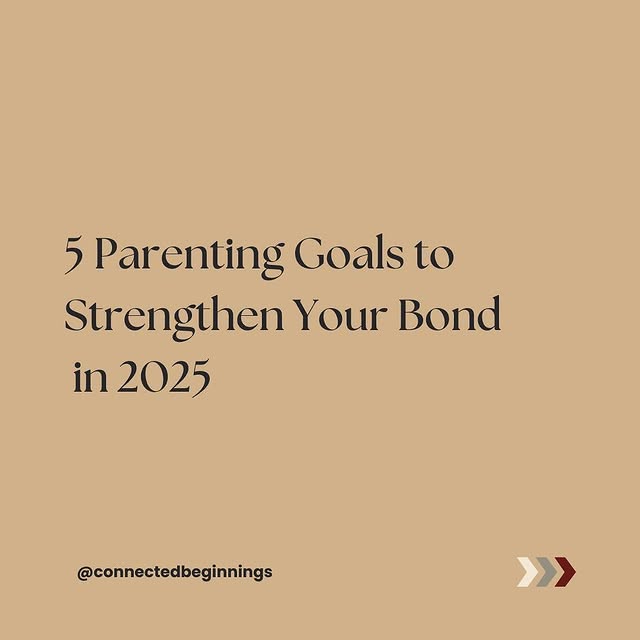
Parenting is a journey, and every year brings new opportunities to grow and connect. As we step into 2025, let’s set intentional goals that nurture our bond with our children and ourselves. ✨ Here are 5 parenting goals to embrace this year: 1️⃣ Focus on connection over correction: Pause and connect before addressing behavior. 2️⃣ Take care of yourself to take care of your family: Self-care isn’t selfish—it’s essential. 3️⃣ Embrace co-regulation in emotional moments: Your calm helps your child navigate their emotions. 4️⃣ Set boundaries with empathy: Boundaries provide safety and structure while showing respect. 5️⃣ Prioritize play and joy with your kids: Laughter and play strengthen bonds and create lasting memories. ✨ Parenting Tip: Small, intentional changes can create a ripple effect of connection and trust. Choose one goal to focus on this month and watch the difference it makes! ✨ Let’s inspire and support each other as we step into a new year of growth and connection. Drop your favorite parenting goal in the comments, and tag another parent to start 2025 with intention and connection! - #ParentingGoals #GentleParenting #NewYearIntentions #MindfulParenting #ParentingJourney #ConnectedParenting #ParentTips #familygoals
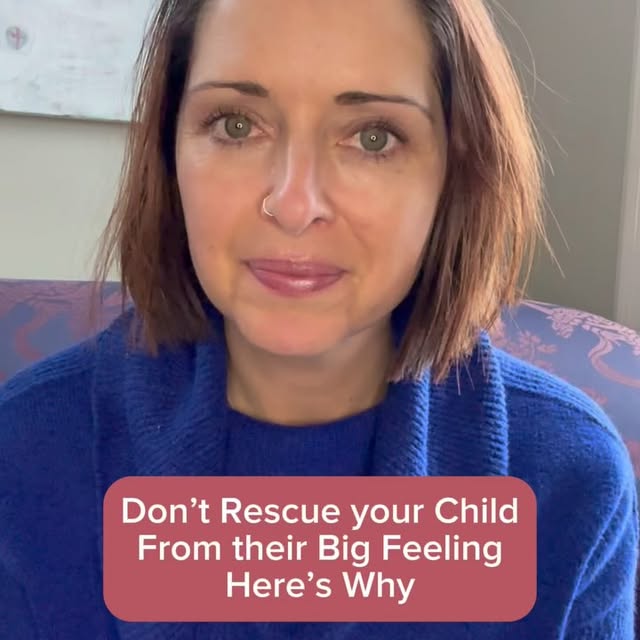
Navigating our children’s emotional landscapes can be deeply challenging, particularly when their feelings evoke our own unresolved emotions. As parents, when we witness our children in distress, our instinct might be to fix the problem, distract, or dismiss their feelings, sending a subtle message that their emotions are somehow not valid. This approach can lead children to suppress their emotions over time, internalizing a belief that their feelings are undesirable or even bad. The key to changing this dynamic is to offer presence rather than solutions, to sit with them in their emotional storms. This not only validates their right to feel but also helps them develop resilience in navigating complex emotions. The difficulty for many parents lies in their own upbringing—perhaps they did not have models who effectively managed and validated their emotions. This can activate a parent’s nervous system, triggering a shutdown response to their child’s emotional expressions. For parents, developing self-regulation tools is crucial. It allows you to calm your own responses and become a steadfast anchor for your child. This shift doesn’t just support your child’s emotional development; it heals and transforms generational patterns, fostering a future where emotions are understood and embraced as a natural part of the human experience. #consciousparenting #gentleparenting #awareparenting #attachmentparenting #connectedparenting #intentionalparenting #parentcoach #intentionalmotherhood #dailyparenting #mindfulparenting #respectfulparenting
Similar Influencers

Sonali & PD

Dominika Knossalla-Pado |Certified Dog Trainer

ProductiveMinds

Peanut App

CassidyandKids

Consumer Reports

First Time Mom Club

🤍🤍🤍🤍🤍🤍🤍🤍

nursesara

Lucinda Pak
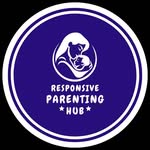
Responsive Parenting | Enhancing Relationships

Cherri V

Jimbo Reid

Dr.Beachgem10

Ashley Walters

The Burnt Out Dog Trainer

Sheléa Melody McDonald

Sam Thompson

Parents

THE HOME EDIT ®

Jordan Howlett

IMOGEN LANG • 🥝🫧🫶🏼

Lewis Howes

Kelly Rowland

Cleber Souza

Beth Sandland | Motherhood, Life, Style, Cotswolds

Kay

Zack

Dr. Mae Hughes I Pelvic Floor Physical Therapist
